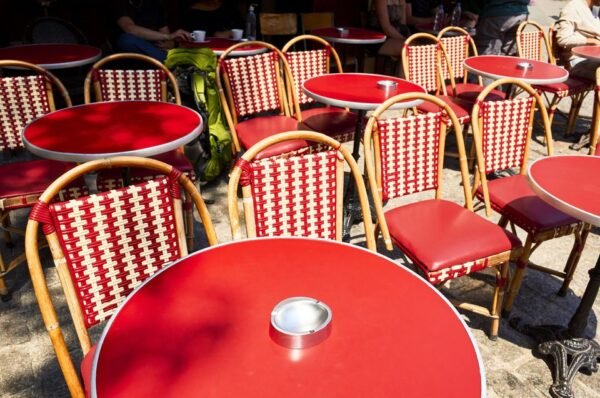
How Coffee Defines the Italian Way of Life

It’s impossible to separate Italy from the rich aroma of coffee that pervades its cities and towns. Italian coffee culture is deeply ingrained in the country’s society, shaping daily rituals and social interactions.
From the iconic shot of espresso to the morning cappuccino, coffee is an irreplaceable part of Italian café society and a symbol of the country’s traditions and values. In this article, we will explore the history of espresso traditions in Italy, examine the role of coffee in Italian cuisine, and provide tips on how to enjoy an authentic Italian-style coffee at home.
So, sit back, grab a cup of coffee from Rave Coffee, and join us on a journey into the heart of Italian coffee culture and the rituals that define the Italian way of life.

The Art of Italian Baristas and Coffee Etiquette
Italian coffee culture is steeped in history and tradition, and no one embodies this more than the skilled baristas who craft each cup of coffee with care and precision. These talented craftsmen and women are an integral part of the Italian espresso bar experience, ensuring that every cup of coffee is a work of art that reflects the rich Italian coffee tradition.
Italian baristas are known for their dedication to the craft, with many undergoing years of training to hone their skills. From understanding how to grind the perfect coffee beans to frothing milk to the ideal consistency, baristas use their knowledge and experience to create the perfect cup of coffee every time.
But it’s not just about the technical skills – Italian coffee etiquette is just as important. In Italy, there are clear rules when it comes to ordering and drinking coffee, and it’s important to understand these etiquette guidelines to fully appreciate the Italian coffee experience.

For example, ordering an italian roast coffee after 11am is generally seen as slightly unusual in Italy, as milk-based coffees are considered a morning drink.
| Italian Coffee Etiquette Tips |
| Order an espresso or macchiato if you’re looking for a quick caffeine hit |
| Drink your coffee standing at the bar to save money – sitting down at a table is often more expensive! |
| Don’t add sugar to your coffee – it’s seen as a way to mask the flavour of the coffee |
| Remember that coffee is about the experience – take your time to enjoy the flavours and aromas |
Whether you visit one of the many Italian espresso bars around the world or try your hand at making Italian-style coffee at home, understanding the art of Italian baristas and coffee etiquette is essential to fully appreciate the rich traditions of Italian coffee culture.
The History of Coffee in Italy and its Influence Worldwide
Coffee has been an integral part of Italian culture for centuries. The history of coffee in Italy dates back to the 16th century, when coffee was first introduced to the country. The drink quickly became popular, and by the 17th century, Italy had established a thriving coffee culture.
Italian coffee brands and roasters have become renowned across the world for their high-quality products. Some of the most well-known Italian coffee brands include Lavazza, Illy, and Segafredo Zanetti. These brands have gained international recognition for their exceptional coffee blends and have helped to spread Italian coffee culture worldwide.
| Italian Coffee Brands | Notes |
| Lavazza | Founded in Turin in 1895; global presence with products sold in over 140 countries |
| Illy | Founded in Trieste in 1933; renowned for its high-quality Arabica coffee beans and sustainable sourcing practices |
| Segafredo Zanetti | Founded in Bologna in 1973; a popular choice for espresso lovers worldwide |
The influence of Italian coffee culture can be felt across the globe. Italian coffee bars can be found in cities all over the world, and the Italian espresso style has become the standard for coffee shops worldwide. The Italian espresso machine, invented in the early 20th century, revolutionised the way coffee is made and has become an essential piece of equipment in coffee shops and homes worldwide! All it takes is for you to throw your nespresso pod in, push the button and… Voilà.
Italian coffee culture has also influenced modern coffee trends such as latte art and speciality coffee. The emphasis on high-quality coffee and the importance of the barista in the coffee-making process are important tenets of Italian coffee culture that have been embraced by coffee enthusiasts and professionals worldwide.
Overall, the history of coffee in Italy and its continued influence worldwide highlight the enduring legacy of Italian coffee culture. From the traditional espresso bars of Italy to the global reach of Italian coffee brands and roasters, Italian coffee culture has left an indelible mark on the world of coffee.
The Role of Coffee in Italian Cuisine
Coffee is an integral part of Italian cuisine, and Italians take their coffee very seriously. Whether it’s a quick shot of espresso with breakfast or a leisurely afternoon coffee break, coffee is an essential part of Italian life.
Coffee Varieties in Italy
Italy offers a wide variety of coffee blends, ranging from a strong and intense espresso to a smooth and creamy cappuccino. One of the most popular blends is the Neapolitan blend, which is a mix of Arabica and Robusta beans. The beans are darkly roasted to create a strong, rich flavour.
Italian Coffee Brewing Methods

One of the unique features of Italian coffee is the brewing method. Espresso machines are a common sight in Italian cafes, bars, and restaurants, and Italian baristas are experts at using them. The espresso is made by forcing hot water through finely-ground coffee under high pressure. The result is a strong and intense shot of coffee with a layer of crema on top.
Italian-Style Coffee at Home
Recreating an authentic Italian espresso experience at home is easy with the right equipment. Start with high-quality coffee beans and a good-quality espresso machine. Practise the art of tamping the coffee and controlling the water temperature to get the perfect shot. For a creamy cappuccino, use a milk frother to create a thick, velvety foam.
Final Thoughts…
In conclusion, coffee plays a vital role in Italian cuisine, and Italians take great pride in their coffee culture. With so many different blends and brewing methods to choose from, there’s something for everyone. Recreating an authentic Italian espresso experience at home is a fun and rewarding way to enjoy this beloved drink.














































